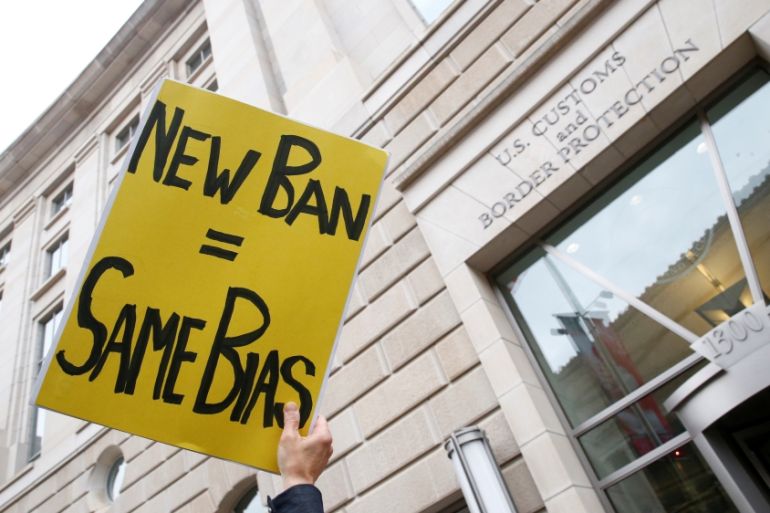Court maintains block on Trump’s Muslim travel ban
US appeal court’s chief judge states revised ban ‘drips with religious intolerance, animus, and discrimination’.

An appeals court from the US state of Virginia refused on Thursday to reinstate President Donald Trump’s temporary travel ban on travellers from six Muslim-majority nations, stating it was rooted in “intolerance”.
The 4th Circuit Court of Appeals ruled 10 to 3 against Trump’s travel ban, and indicated opponents of Trump were likely to succeed at trial in showing the policy violates US constitutional prohibitions on religious discrimination.
Keep reading
list of 4 itemsUS House passes bill to prevent another ‘Muslim ban’
Dreams dashed: Trump’s Muslim ban damage may never be undone
Will Biden’s repeal of Trump’s travel ban reverse its impact?
The decision, written by Chief Judge Roger Gregory, described Trump’s executive order as using “vague words of national security, but in context drips with religious intolerance, animus, and discrimination”.
Gregory quoted statements by Trump during his campaign calling for a “Muslim ban”, and wrote that a reasonable observer would likely conclude the order’s “primary purpose is to exclude persons from the United States on the basis of their religious beliefs”.
OPINION: Trump’s Muslim ban is a dangerous distraction
Trump’s administration argued the court should not look beyond the text of the executive order, which doesn’t mention religion. The countries were not chosen because they are predominantly Muslim, but because they present “terrorism” risks, the administration claimed.
Attorney-General Jeff Sessions said it is the president’s “duty to protect our communities from terrorism” and vowed to bring a review of the latest ruling to the US Supreme Court.
“President Trump’s executive order is well within his lawful authority to keep the nation safe,” Sessions said in a statement.
“The Department of Justice strongly disagrees with the decision of the divided court, which blocks the president’s efforts to strengthen this country’s national security… The president is not required to admit people from countries that sponsor or shelter terrorism, until he determines that they can be properly vetted and do not pose a security risk to the United States.”
This renewed blow to the White House represents another step in the legal battle with the US Supreme Court making a definitive ruling.
READ MORE: Trump’s travel ban – How could Hawaii block it?
The appeals court was reviewing a March ruling by Maryland-based federal judge Theodore Chuang that blocked part of Trump’s March 6 executive order barring people from Libya, Iran, Somalia, Sudan, Syria and Yemen for 90 days while the government put in place stricter visa screening.
A similar ruling against Trump’s policy from a Hawaii-based federal judge is still in place and will be reviewed by the 9th Circuit Court of Appeals.
|
|
Trump issued a first travel ban order on January 27, just a week after the Republican president took office. It led to chaos and protests at airports before it was blocked by courts.
The second order was intended to overcome the legal issues posed by the original ban, but it was blocked by judges before it could go into effect on March 16.
The Maryland case was brought by the American Civil Liberties Union and the National Immigration Law Center on behalf of organisations as well as people who live in the US, and feared the executive order would prevent them from being reunited with family members from the banned countries.
“President Trump’s Muslim ban violates the constitution, as this decision strongly reaffirms,” said Omar Jadwat, director of the ACLU’s Immigrants’ Rights Project, who argued the case.
“The constitution’s prohibition on actions disfavouring or condemning any religion is a fundamental protection for all of us, and we can all be glad that the court today rejected the government’s request to set that principle aside.”
